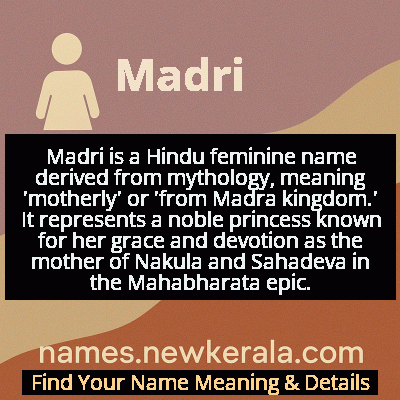Madri Name Meaning & Details
Origin, Popularity, Numerology Analysis & Name Meaning of Madri
Discover the origin, meaning, and cultural significance of the name MADRI. Delve into its historical roots and explore the lasting impact it has had on communities and traditions.
Name
Madri
Gender
Female
Origin
Hindu
Lucky Number
9
Meaning of the Name - Madri
Madri is a Hindu feminine name derived from mythology, meaning 'motherly' or 'from Madra kingdom.' It represents a noble princess known for her grace and devotion as the mother of Nakula and Sahadeva in the Mahabharata epic.
Madri - Complete Numerology Analysis
Your Numerology Number
Based on Pythagorean Numerology System
Ruling Planet
Mars
Positive Nature
Generous, passionate, energetic, and humanitarian.
Negative Traits
Impulsive, impatient, moody, and can be overly emotional.
Lucky Colours
Red, maroon, scarlet.
Lucky Days
Tuesday.
Lucky Stones
Red coral, garnet.
Harmony Numbers
1, 2, 3, 6.
Best Suited Professions
Military, sports, philanthropy, leadership roles.
What People Like About You
Courage, energy, leadership, generosity.
Famous People Named Madri
Madri (Mythological)
Queen, Mythological Figure
Second wife of King Pandu and mother of Nakula and Sahadeva in Mahabharata
Madri B. K.
Social Worker
Renowned for women's education initiatives in rural India
Madri Singh
Classical Dancer
Award-winning Kathak dancer and cultural ambassador
Name Variations & International Equivalents
Click on blue names to explore their detailed meanings. Gray names with will be available soon.
Cultural & Historical Significance
Her most enduring legacy lies in being the mother of Nakula and Sahadeva, two of the five Pandava brothers whose adventures form the core of the Mahabharata. Madri's ultimate act of self-immolation following her husband's death, while controversial in modern context, was seen as the ultimate expression of wifely devotion in ancient times. This act cemented her place in cultural memory as a symbol of sati and pativrata dharma. The name Madri continues to evoke images of royal elegance, maternal sacrifice, and the complex interplay of duty and emotion that characterizes much of Hindu epic literature.
Extended Personality Analysis
People named Madri typically exhibit a blend of traditional grace and quiet strength. They are often perceived as nurturing individuals with strong family values, reflecting the mythological Madri's role as a devoted mother and wife. Their personality is characterized by emotional intelligence and the ability to maintain harmony in relationships, much like the diplomatic princess who navigated the complexities of being a second wife in a royal household. Madri-named individuals tend to be compassionate listeners and reliable confidantes, often putting others' needs before their own.
Despite their gentle exterior, those named Madri possess remarkable inner resilience and determination. They approach challenges with a balanced perspective, combining traditional wisdom with practical solutions. Their loyalty to family and principles is unwavering, and they often serve as the emotional anchor in their social circles. While they respect traditions, they also demonstrate adaptability to changing circumstances. The name carries an aura of dignified elegance, and individuals bearing it often naturally command respect through their composed demeanor and thoughtful actions rather than overt assertiveness.
Modern Usage & Popularity
In contemporary naming practices, Madri maintains its status as a traditional Hindu name with deep cultural roots, though it's not among the most commonly used names. Its usage is primarily concentrated among families with strong connections to Hindu mythology and cultural traditions, particularly in North Indian states like Uttar Pradesh, Bihar, and Madhya Pradesh. The name appeals to parents seeking meaningful mythological names that are distinctive without being obscure. While it hasn't experienced the surge in popularity seen with names like Draupadi or Sita, Madri maintains a steady, niche presence. Among the Hindu diaspora, the name is occasionally chosen by parents wanting to preserve cultural heritage while honoring the complex, realistic female characters from epics rather than just the idealized ones. Its elegant two-syllable structure and soft pronunciation make it phonetically appealing across languages.
Symbolic & Spiritual Meanings
Symbolically, Madri represents the intricate balance between personal desire and social duty that characterizes much of Hindu philosophical thought. As a princess who entered a polygamous marriage and became mother to two key Pandava brothers, she symbolizes the web of relationships and responsibilities that define human existence. The name carries connotations of royal elegance and maternal devotion, but also the sacrifices required by traditional roles. Metaphorically, Madri embodies the concept of 'dharma in complexity' - navigating multiple relationships and obligations while maintaining personal integrity. Her story symbolizes how individual lives are intertwined with larger cosmic narratives, and how personal choices ripple through generations. The name also represents the cultural exchange between different kingdoms and traditions through marriage alliances, making it a symbol of unity in diversity. Furthermore, Madri's character illustrates the Hindu belief in the cycle of life, death, and rebirth, and the eternal nature of soul connections across lifetimes.

